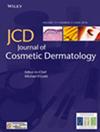Telogen effluvium, the most common cause of diffuse and non-scarring alopecia in women, is frequently diagnosed in dermatology outpatient clinics and can be caused by various etiological factors such as medications, trauma, emotional, and physiological stress. In patients presenting with complaints of telogen effluvium, we aimed to investigate abnormal levels of serum ferritin, vitamin B12, folic acid, thyroid function tests, and hemoglobin and determine which of these abnormal values might be significantly associated with telogen effluvium.
In this study, 2851 female patients diagnosed with telogen effluvium who applied to the Dicle University Dermatology outpatient clinic between January 1, 2010 and June 30, 2024 were retrospectively evaluated. The relationship between these laboratory abnormalities and telogen effluvium, as well as their significance in different age groups, was analyzed using the SPSS-27.0 program. Associations were analyzed using Kolmogorov–Smirnov test, dependent t-test, Wilcoxon test, Pearson chi-square (χ2) test, Yates chi-square (χ2) test, Fisher chi-square (χ2) test analysis, Mc-Nemar test, Pearson/spearman correlation analysis, and logistic regression analysis. A p value of < 0.05 was considered statistically significant.
The mean age of 2851 female patients included in our study was 26.33 years, 12.8% (n = 366) were under 18 years of age, 83.5% (n = 2380) were between 18 and 45 years of age, and 3.7% (n = 105) were over 45 years of age. Hemoglobin values were determined in 2496 of 2851 patients and values below the reference range were found in 317 patients (11.1%). Ferritin was found to be low in 1123 (46.5%) of 2413 patients. Vitamin 12 deficiency was detected in 150 (5.8%), folic acid deficiency in 8 (0.6%), and iron deficiency in 685 (29.5%) patients. As can be seen in our study, deficiency of laboratory parameters, especially ferritin and serum iron, is a common finding in female patients presenting with TE.
This study showed that biochemical tests, complete blood counts, and hormonal tests are important tools in investigating the etiology and guiding the treatment in patients diagnosed with telogen effluvium, as various etiological factors may be present. Furthermore, it was determined that parameters such as vitamin B12, ferritin, TSH, and T3 hold varying levels of importance during significant phases of women's physiological development, such as adolescence and post-menopausal periods.


